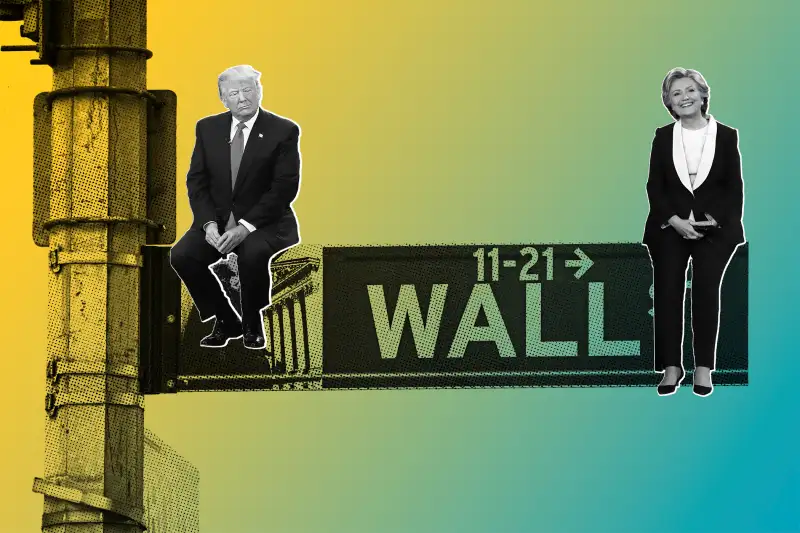How You Can Tell Wall Street Really Favors Clinton
Money is not a client of any investment adviser featured on this page. The information provided on this page is for educational purposes only and is not intended as investment advice. Money does not offer advisory services.

Donald Trump is running on his business record, but recent stock market moves suggest Wall Street is pulling hard for Hillary Clinton.
Of course, that shouldn't come as a total surprise. Clinton, the Democratic presidential nominee, has been criticized for her close ties to Wall Street, including paid speeches to Goldman Sachs. She has also received tens of millions of dollars from donors who work at hedge funds and private equity funds. And one prominent economic research firm has suggested her Republican rival's trade and immigration policies, if enacted, could spark a recession.
A new academic paper, though, puts an even finer point on it — looking at actual stock market returns from September to forecast how markets might react, at least in the short-term, to a Clinton loss and Trump presidency.
It isn't pretty.
By analyzing recent stock market moves, the authors, Justin Wolfers at the University of Michigan and Eric Zitzewitz at Dartmouth College, predict that a Trump victory could shave more than 10% off the value of the S&P 500.
That's the equivalent of a "market correction," a significant drop in prices, although not as serious as a "bear market," which is usually defined as a decline of at least 20%. In the restrained language of the economists: "Financial price movements suggest market participants expect a stronger economy under a President Clinton and higher risk under a President Trump."
Of course, forecasting stock market moves is a notoriously tricky business. The paper gives extra insight into what professional investors — a group that arguably represents prevailing attitudes among America's business class — thinks is at stake in November.
The results shouldn't be taken as investing advice. That's especially true with Clinton so far ahead in the polls. While a surprise Trump victory might prompt a volatile reaction, there is little evidence that a widely-expected Clinton win would result in a rally.
So how on earth can the authors claim the stock market would be more than 10% lower under a President Trump?
While predicting future stock market moves is a fool's game, we can be a little more certain when looking into the past. As it turns out the 2016 election provided an unusual circumstance that's about as close to a controlled experiment in the stock market as you are likely to see.
The stars aligned on Sept. 26, the evening of the first debate. Going into the contest, Trump had spent the previous two weeks steadily rising in the polls and the candidates were nearly tied. Once the debate got underway, however, it quickly became apparent to most observers that Trump was stumbling badly and Clinton's chances of election were getting better.
Add in the fact that the debate took place at 9 p.m. Eastern Time, when there is little other news to affect market prices, and the situation offers a unique opportunity for gauging just how stock traders actually reacted to a shift in political momentum.
To arrive at their estimate, the two authors first looked not at financial markets, but how prediction, or betting, markets reacted during the debate. Action during and shortly after the face-off suggested Clinton's performance boosted her chances of winning the election from about 63% to about 69%, according the paper. The authors then compared those results to price moves for S&P 500 futures.
The futures, derivatives pros use to trade on stocks during off hours, jumped about 0.7%, a significant move for such a short time frame. Extrapolating from those two market shifts, the authors forecast a Clinton victory would translate into a stock market valued at about 12% more than under a Trump victory. (They also projected a Trump victory would send Asian and U.K. stocks down and increase future stock market volatility, among other findings.)
So why can't investors capitalize on results? You might have, if back in late September you had been convinced ahead of time that Clinton would best Trump in the first debate. By now, however, even if the academics' estimates are spot on, it's probably too late. That's because with Clinton leading comfortably in key battleground states, it's become conventional wisdom that she is steaming for victory. As a result, stock prices almost certainly already reflect that outcome.
Indeed, at 2,150, the S&P 500 is essentially flat since the Sept. 26 debate, during a time when Clinton has only further consolidated her advantage. And the index is up about 5% overall, since Jan. 1, one month before the Iowa Caucuses, when Trump still seemed like a long-shot candidate.
Of course, today an investor who is brave enough to bet on a surprise Trump win, might come out ahead....if you could somehow predict that was going to happen.
